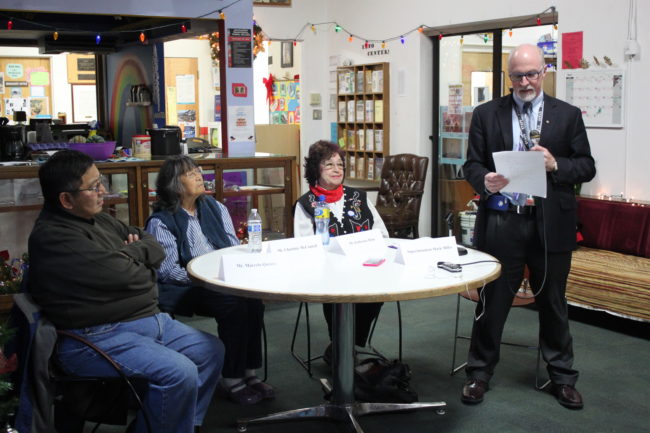
Juneau Schools Superintendent Mark Miller says the district will remove four controversial readers from the elementary school language arts curriculum. He announced his decision at a press conference Thursday at the Zach Gordon Youth Center.
Back in August, community members raised concerns about texts depicting Alaska Native and Native American tragedies. The readers were called distorted, inaccurate and insensitive. A district committee reviewed the curriculum materials and voted 7-2 to remove them from classrooms.
Superintendent Mark Miller didn’t announce his decision alone – he brought along three Native elders who had all attended Native boarding schools.
Charlotte McConnell was 7 when her mother died and her father sent her and her siblings to boarding school.
She was told by her aunt, “‘You can’t speak no Tlingit, you got to speak English, you’re going to school.’ And so that’s where I got understanding English only.”
McConnell attended schools in Juneau, Seward, Wrangell and Sitka.
The loss of cultural identity at Native boarding schools is one of the experiences depicted in the McGraw-Hill Reading Wonders curriculum. Others were the Trail of Tears and the excavation of Native burial grounds.
Miller says the readers don’t meet the needs of Juneau students, but he thinks it’s positive the curriculum includes instructional time for understanding Native experiences.
“I am calling on the community to come together with the school district to document and tell your truth. Come into our classrooms. Help us teach our children about our local history,” Miller says.
Most copies of the readers will be returned to the publisher, he says, and replaced with materials developed by the district in collaboration with Goldbelt Heritage Foundation and Sealaska Heritage Institute. A few copies will be kept at the district office for students who wish to read them.
He says understanding culture and race is an important part of any student’s education.
“Whether in Ferguson, Mo., Juneau, Alaska, or anywhere in between, difficult conversations and debates need to occur. We are all products of both our own personal experiences as well as those of our ancestors. Academic institutes, by their very nature, are an important forum in which to have these conversations and debates,” Miller says.

Paul Berg is a curriculum developer and cultural specialist at Goldbelt Heritage Foundation. His report on the readers was the formal complaint that led to their removal. He said the texts misrepresented the historical reality and marginalized the experiences of the victims. Berg is pleased with Miller’s decision.
“It’s an opportunity to confront some uncomfortable historical facts and historical realities and it’s an opportunity to bring about healing, healing within the Native community but also within the non-Native community,” Berg says.
Freda Westman is Grand President of the Alaska Native Sisterhood. For her, the decision was the only one Miller could’ve made.
“This was not a Native issue; it was an issue for all children. All Alaskans want their children to be educated correctly and be given the information no matter what, but it depicts it truthfully. That’s what history is about,” Westman says.
She’s grateful for all the community members – Native and non-Native – who came together to make sure the materials were removed.
“We have been fighting these battles for a long time. Over 40 years, I’ve been doing this,” Westman says.
She hopes the district and the Alaska Native community will work together more closely from now on.
Editor’s note: An earlier version of this story said Juneau School District will be working with Sealaska to develop replacement materials. The district will be working with Sealaska Heritage Institute.